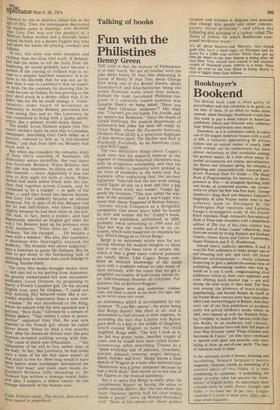Talking of books
Fun with the Philistines
Benny Green
THE truth is that the humour of Philistinism is an easy touch. We are all familiar with the joke about Henry IV Part One abdicating in favour of Henry IV Part Two, about George Eliot being one of the Brontë Sisters, about Shostakovich and Khachachurian being the noises Russians make when they sneeze. Perhaps the most convoluted Philistine response to a culturally loaded question was Groucho Marx's on being asked, "Have you read Hans Christian Andersen"? His reply was, "I haven't got red hands, I'm Jewish, and my name's not Andersen." Since the death of Gerald Hoffnung, the musical department of deliberately bad jokes has been left solely to Victor Borge, whose My Favourite Intervals (Woburn Press £2.25) is a structural duplicate of that derisive pearl, The Decline and Fall of Practically Everybody, by an American cynic called Will Cuppy. The two distinctive things about Cuppy's book were that his slapstick humour at the expense of venerable historical characters was built on scrupulous scholarship, and that his sardonic asides to posterity were printed in the form of footnotes to the main text. For instance, after explaining that the ancient Egyptians "believed that the sun went sailing round Egypt all day on a boat and that a pig ate the moon every two weeks", Cuppy appends the footnote, "This was called the wisdom of the ancients." And it was Cuppy who wrote that classic fragment of Roman history, "Antony struck Cleopatra as a delightful companion. One never knew what he would do next and neither did he." Cuppy's book, which was published, unfinished, in 1950, probably owed something to 1066 and All That but was far more incisive in its criticisms, which were based not on slapstick but fact. Which brings us to Victor Borge.
Borge is an extremely astute man for not having allowed his musical insights to blind him to one of the basic facts of artistic life, i
which s that a great many cultural postures are totally. idiotic. Like Cuppy, Borge combines an intimate knowledge of the inside facts with a stubborn refusal to take many of them seriously, with the result that we get a delightful succession of half-truths whose utter ridiculousness disarms all criticism. For instance, this on Richard Wagner:
Richard Wagner wore pink underwear, climbed trees, and liked to stand on his head, but right side up he wrote some nice music.
an irreverence which is accompanied by the footnote "If you,like operas", the point being i that Borge doesn't like them at all, and s determined to fool around at their expense. In recording the fact that Cosima von Bulow gave birth to a boy in the middle of Siegfried, which caused Wagner to name the child Siegfried, Borge adds, "The way I look at it, the kid was pretty lucky. Another couple of years, and he would have been called Gotterdammerung. After describing Tristan as a "plain everyday tale of jealousy, treachery, sorcery, passion, remorse, anger, betrayal, death, murder and love," Borge leaves a final sketch of Wagner as a man who believed that "Beethoven was a great composer because he had a thick skull," and moves on to the rest of the figures in the musical pantheon.
But it is opera that Borge is really after. He compliments Mozart on having the sense to prefer sensible libretti, like "the one where the main character spends half his time hiding inside a goose", sums up Rimsky-Korsakov with "Most of his operas are about golden
roosters and witches in disguise and animals that change into people and other contemporary social problems", and offers the following plot synopsis of a turkey called The Ruins of Athens for which Beethoven composed incidental music:
It's all about Minerva and Mercury, two Greek gods who have a hard night on Olympus and lie down for a 2,000 year snooze. When they get up they go down to see how Athens is doing after all that time. They should have stayed in bed another couple of thousand years. Athens is a mess. Then they go over to see how Rome is doing. Rome is even a bigger mess than Athens.


































 Previous page
Previous page